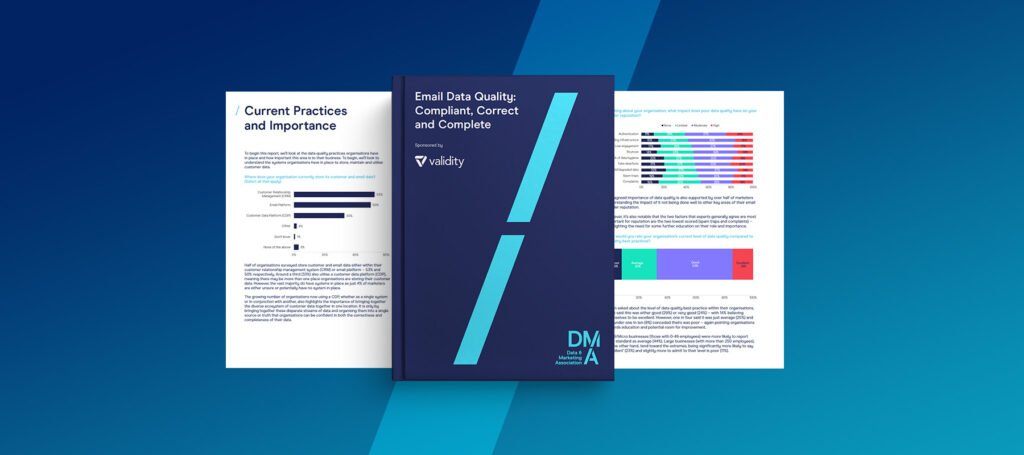Validity and the Data & Marketing Association (DMA) recently published the ”Email Data Quality: Compliant, Correct, and Complete” report. It highlights how important most marketers consider data quality and its three core tenets of compliance, correctness, and completeness.
We talk about data being the new oxygen, and a vital part of our industry. Without it, marketers would not be able to understand their customers, nor engage with them. It’s reassuring to see most companies understand this, but there are also clear opportunities for improvement, as the following findings demonstrate:
- Most businesses monitor their data quality (77% of respondents)
- The use of key performance indicators (KPIs) to measure data quality is also reasonably common (61%)
- But only two-thirds (67%) rate their data quality as good compared to industry best practice.
This last point carries real costs. The report calculates Cost Per Acquisition (CPA) at ± £29, which places the impact of poor data quality in stark relief. In the UK, a typical medium-sized business generates ± £20m of annual revenue and average profit margins of 12%, according to UK Government statistics. For these companies, bad data is a £1m problem that erodes profitability by as much as 33%. For big businesses, the cost can be much greater.
This holds especially true as use of Artificial Intelligence (AI) grows. While AI has driven spam filtering and fraud prevention solutions for a while, it’s increasingly being used for tasks like content selection, engagement prediction, and journey mapping. But around four-fifths of businesses running AI projects encounter problems with data quality, with primary issues including not enough data, data not in a usable form, and bias or errors in the data.
The report also contains plenty of good news. During the past year, marketing underwent a transformation as businesses adapted to major changes in their customers’ working practices and personal situations. The COVID-19 pandemic drove big changes in promotional strategy, meaning updated content and new tones of voice – a rapid evolution in personalisation. Having complete data to achieve this credibly and authentically has never been more important.
Because of this, marketers are focusing on techniques that build this additional layer of personalisation-rich insights. The report shows more data is being collected about customers’ location, product interests, and channel preferences, and this data is being collected across the customer lifecycle: at point of sign-up, through progressive profiling, and the use of preference centres.
This is reflected in a standout theme from this report—the rise of the Customer Data Platform (CDPs). CDPs create a unified customer database, cleaning and combining data from multiple sources into a structured format for use by other marketing systems, meaning richer data. The report shows CDP users are far more likely to use preference centres as part of their data acquisition strategy, and to segment/personalise based on subscriber interests. Customer engagement is seen as a direct function of data quality, and their ability to calculate cost-per-acquisition, return on investment, and customer lifetime value is significantly higher.
All-too-often, data quality is a classic case of not knowing what you don’t know, which is why the findings in this report are so important. It surfaces what’s important when it comes to the “3Cs” of data quality: compliance; correctness; and completeness, and provides a benchmark of what stage your data quality journey has reached, as well as identifying opportunities for improvement.
At Validity, this is a topic close to our hearts. Around the world, we’re the most trusted name in customer data quality, and thousands of organisations rely on Validity solutions like Everest and DemandTools to manage their customer data and make confident decisions that drive more leads, sell more products, and deliver continued growth.
Want to learn more? Join us for our next webinar on February 16, when we’ll review the report in detail, and hear from our expert panel on how to apply the most important learnings to enhance your data quality strategy.
